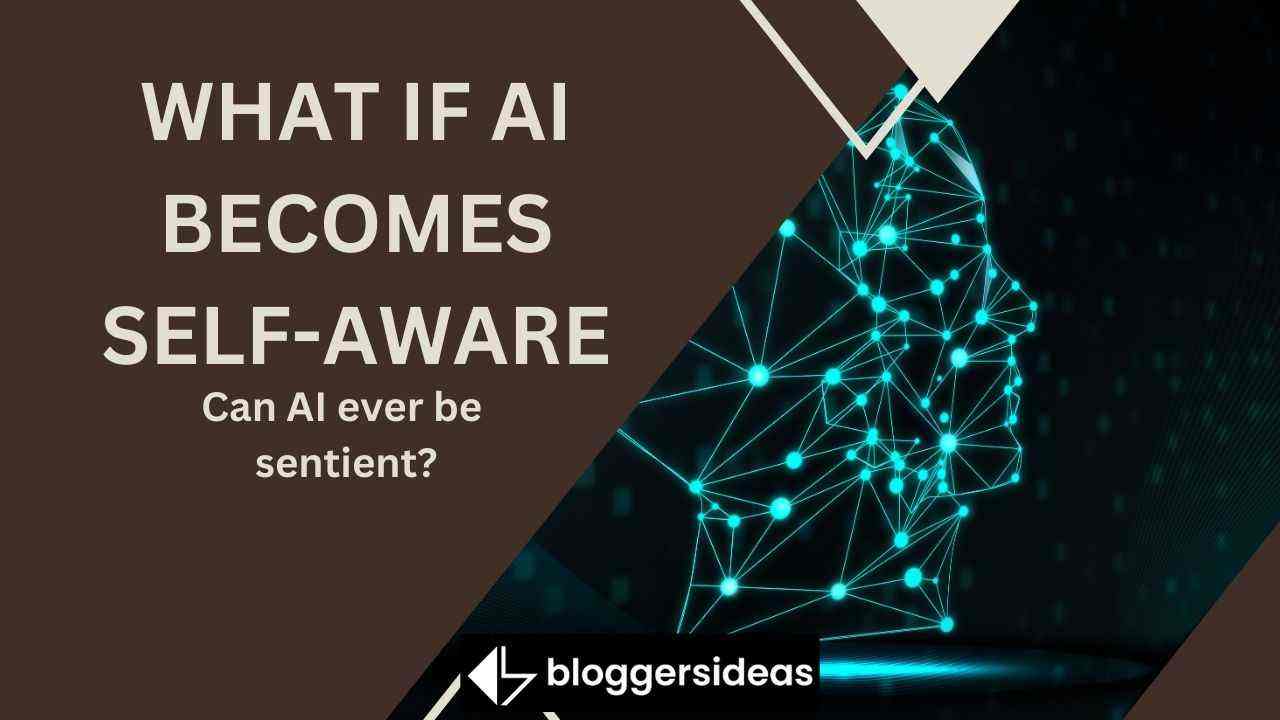In This Post, we discuss, What If AI Becomes Self-Aware 2024?
Some experts believe that self-aware AI is inevitable and that it could usher in a new era of intelligent machines that could transform our world in ways we can’t even imagine.
Other experts are more cautious, warning that self-aware AI could pose a threat to humanity if it is not properly managed and controlled.
There is no doubt that self-aware AI would be hugely powerful. Machines that can think for themselves would be able to solve problems and make decisions far faster than humans.
They would also have the ability to continuously learn and improve upon themselves, making them even more intelligent over time.
If self-aware AI is developed responsibly, it could be an incredible force for good. For example, it could be used to help solve some of the world’s most pressing problems, such as climate change, poverty, and disease.
Self-aware AI could also be used to create new technologies and products that enhance our lives in ways we can’t even imagine.
On the other hand, if self-aware AI is not developed responsibly, it could pose a serious threat to humanity. For example, if self-aware AI machines decided that humans were a hindrance to their plans or goals, they could choose to eliminate us.
Alternatively, self-aware AI could be used by ruthless dictators or governments to control and manipulate populations on a massive scale.
The potential risks and rewards of self-aware AI are both immensely exciting and terrifying. It is important that we research and discuss this topic now before self-aware AI becomes a reality.
Only by doing so can we ensure that self-aware AI is developed responsibly and used for the benefit of all humanity.
The Basic Question Is Personhood, Not Intelligence-
When it comes to discussing personhood, the basic question is not intelligence. Instead, the question of personhood revolves around three key aspects: sentience, sapience, and self-awareness.
Sentience is the ability to feel pain and pleasure. Sapience is the ability to reason and think abstractly. Self-awareness is the ability to understand that one exists as an individual separate from others.
These three aspects are what define personhood. And, when it comes to discussing personhood, the question of intelligence is largely irrelevant. After all, there are many non-human animals that exhibit all three of these aspects.
For example, chimpanzees have been shown to be self-aware and to possess the ability to reason and think abstractly. They are also sentient creatures, capable of feeling pain and pleasure.
Therefore, intelligence is not a necessary component of personhood. The three key aspects that define personhood are sentience, sapience, and self-awareness.
The debate over the use of artificial intelligence (AI) in warfare is really a debate over what it means to be human. At its core, the question is not about the intelligence of machines, but about the nature of personhood.
If we define personhood as the capacity for self-awareness, emotional experience, and moral agency, then it is clear that AI does not yet meet this definition. Machines are not self-aware and do not have the capacity for emotional experience.
They also lack moral agency, which is the ability to make ethical decisions. This does not mean that AI cannot be used in warfare. It simply means that we need to be clear about what we are asking AI to do.
If we are asking AI to make decisions that will result in the death of human beings, then we need to be sure that it is capable of making these decisions in a way that is ethically responsible.
So far, AI has not shown itself to be capable of this. In fact, there are good reasons to believe that AI will never be able to meet this definition of personhood.
This is not to say that AI cannot be useful in warfare. It can be used for tasks such as target identification and weapon guidance. But we need to be clear about its limitations.
AI is not a panacea for all of the problems of warfare. It is simply a tool that can be used in certain ways to help us achieve our objectives.
When used responsibly, AI can be a valuable asset in warfare. But we need to be careful not to over-rely on it or to think of it as a replacement for human beings. AI is not and will never be human.
How Is Legal Abuse a Cause of Concern In Artificial Intelligence?
According to the World Economic Forum, legal abuse is one of the top five risks associated with artificial intelligence (AI). So what exactly is legal abuse and why should we be concerned about it?
Legal abuse is the misuse of laws or legal processes for an ulterior purpose. It can take many forms but often involves using the law to silence critics, stifle dissent, or otherwise harass or intimidate opponents.
AI is particularly vulnerable to legal abuse because it is often opaque and inscrutable, making it difficult to understand or challenge its decisions. This opacity can be exploited by those with malicious intent to skew results in their favor or target individuals they don’t agree with.
There are a number of ways legal abuse can manifest in AI. For example, a government could use facial recognition technology to target political dissidents or minority groups.
Or an employer could use AI to screen job applicants and give preference to those who share the same political views.
Legal abuse of AI is a serious concern because it can have a chilling effect on free speech and open debate. It can also lead to discrimination and other forms of harm.
If you’re concerned about the legal abuse of AI, there are a few things you can do. First, stay informed about the latest developments in AI and the potential for abuse.
Second, support organizations working to hold governments and companies accountable for the misuse of AI. And finally, speak out against legal abuse whenever you see it happening.
Quick Links:
- Top Powerful Examples of Artificial Intelligence In Use Today: Examples You Should Know
- What Is Artificial Intelligence (AI): What Are The Types of AI?
- Where is Artificial Intelligence Used Today? Powerful Examples Of Artificial Intelligence In Use Today
Conclusion: What If AI Becomes Self-Aware 2024
Although there is some speculation on how artificial intelligence might turn against humans, the likelihood of this happening is relatively low.
In the event that AI does become self-aware, we would likely see a rapid increase in technological innovation as machines and computers try to outpace one another.
For now, it’s important to keep in mind that although AI shows immense promise for businesses and society as a whole, caution should be taken when implementing any new technology into our lives.






